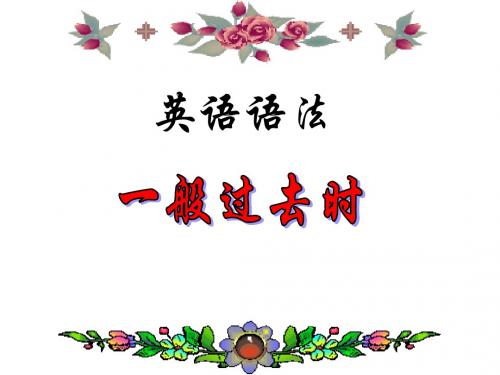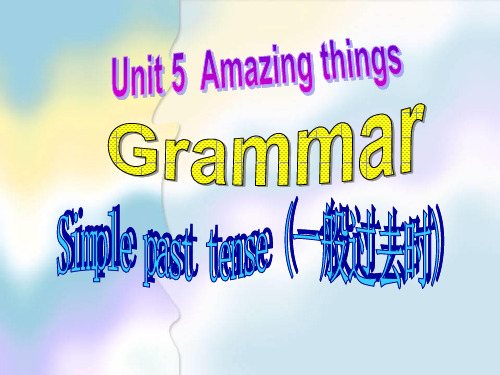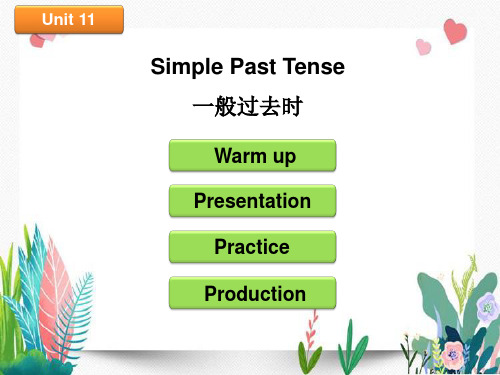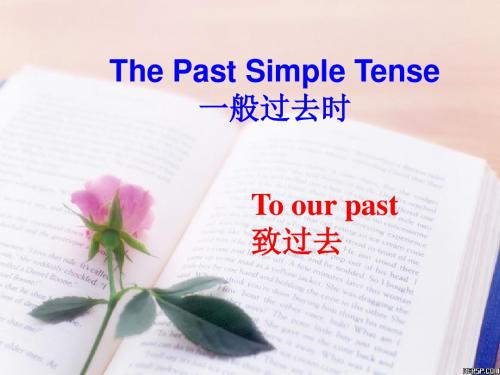一般过去时课件(PPT)
合集下载
一般过去时-ppt课件

played /d/
wanted
listened
/Id/ liked
;.
9
我们一起来看结果:
walked
/t/
visited
played /d/
wanted
listened
/Id/ liked
;.
10
一般过去时解题宝典
;.
11
否定句的改写:
当句中含有be动词was,were 时, was,were和not搭配,构成wasn’t , weren’t,其他顺序不变,some变any。
usually
last Mid-Autumn Festival
every day three days ago on Mondays
tomorrow a moment ago 14 years ago
;.
4
跟着节拍唱一唱吧
一般情况加ed; 若遇词尾哑巴e, 加d轻松就搞定; ty,ry和dy, 改y变i加ed; 规则变化挺简单, 其他功夫不可少; be动词,很重要, 过去要变was、were。
;.
18
请你来挑战:
6. Did you _____ (call)camll e last Sunday?
did
do
7. What ______ you _____ (do) last night?
did 8. Where _____ (do) you live last year? 9. What time did you ______( get) up this mgeotrning? 10. How ______ yoduid_______( go) to schooglobefore?
初中英语一般过去时课件(PPT)

played
did
don’t/ doesn’t
She doesn’t play basketball after school. She _________ basketball after school yesterday.
do/ does
didn’t
did
didn’t watch
didn’t play
一、句型转换 1. The children had a good time in the park. 否定句:The children did not have a good time in the park. 一般疑问句:Did the children have a good time in the park? 对划线部分提问:Where did the children have a good time? 2. There were about nine hundred people at the cinema. 否定句:There were not about nine hundred people at the cinema. 一般疑问句:Were there about nine hundred people at the cinema? 对划线部分提问:How many people at the cinema?
Did
Did
go
go
规则变化 1.一般加ed
2.以e结尾加d
3.末尾只有一个辅音字母的重读闭音节词,先双写这个辅音字母,再加ed .
work —
worked
change —
changed
prefer —
preferred
stop —
did
don’t/ doesn’t
She doesn’t play basketball after school. She _________ basketball after school yesterday.
do/ does
didn’t
did
didn’t watch
didn’t play
一、句型转换 1. The children had a good time in the park. 否定句:The children did not have a good time in the park. 一般疑问句:Did the children have a good time in the park? 对划线部分提问:Where did the children have a good time? 2. There were about nine hundred people at the cinema. 否定句:There were not about nine hundred people at the cinema. 一般疑问句:Were there about nine hundred people at the cinema? 对划线部分提问:How many people at the cinema?
Did
Did
go
go
规则变化 1.一般加ed
2.以e结尾加d
3.末尾只有一个辅音字母的重读闭音节词,先双写这个辅音字母,再加ed .
work —
worked
change —
changed
prefer —
preferred
stop —
一般过去时态ppt课件

2、表示过去经常或反复发生的动作。 My father often went to work by bus last year. When I was a child, I often listened to music.
可编辑课件PPT
9
6.练习
1.They_w_e_re(be) doctors last year. 2.You _h_a_d(have) a class this morning. 3.She_ra_n_ (run) very fast yesterday.
passed cooked
2、元浊 /d/ ,即 ed 在元音,浊辅音后面念 /d/ ,
例:borrowed enjoyed
called moved
3、/t/ /d/ 之后念 /id/ , 即 ed 在 /t/ /d/ 音后面念 /id/
可编辑课件PPT
例:wanted shouted needed counted6
4.一般过去时的否定和一般疑问句 1)We had a good time yesterday.
We didn’t have a good time yesterday. Did you have a good time yesterday? 2)She was a teacher in 1980s.
4.She_s_tu_d_ied (study) Chinese two years ago. 5.He_p_la_yed(play) tennis last week.
6.He found an amusing book.(变否定和一般疑问)
He didn’t find an amusing book.
stop stopped plan planned
初一英语语法:一般过去时(共22张PPT)

cost →cost花钱
read→read读书
cut → cut 砍,剪 hurt → hurt受伤
2)变元音字母为a run→ran跑
give→gave给 sing→sang唱歌
come → came过来 drink→drank喝 swim→swam游泳
sit→sat坐下 begin→began开始
feel build fight give teach sing buy cut come draw drink drive hope use start
felt built fought gave taught sang bought cut came drew drank drove hoped used started
2. watch, John, did, TV, weekend, last. _J_o_h_n_d_i_d_w_a_t_ch__T_V_l_as_t_w_e_e_k_e_n_d_. ___________
3. went, I ,to, by, park, a, bike
_____I _w_e_n_t_t_o__a_p_a_r_k_b_y__b_ik_e__. ___________ 4. jumped, the, into, lake, he, and, the, to, swam, kite.
19) My sister _w_a__s_ (be) born on June 5. 1996. 20) W__e_r_e_ (be) your parents at home just now? 21) He _s_tu__d_ie_d_ (study) French here last year. 22) She __d_i_d_ (do) homework last night. 23) They _w__e_n_t(go) to the zoo yesterday morning. 24) We __h_a_d_ (have) a party last Saturday. 25) Joy _v_is_i_te__d (visit) me yesterday evening. 26) They __l_iv_e_d_ (live) here two years ago. 27) He _w__a_s_(be) here a moment ago.
一般过去时(12张PPT)初中英语专项复习课件

The Country mouse went to the house of the City mouse. It was a very good house. Nice food was set ready for them to eat. But just as they began to eat they heard a great noise. The City mouse cried, " Run! Run! The cat is coming!" They ran away quickly and hid.
一般过去时 初中英语专项分析
一般现在时 de 应用场景
过
动作行为
去
发
生
曾经
的
存在的状态
识别 标志词 理解 句意
答题技巧
熟练 动词 转换
yesterday last week 3 days ago
动词 过去式
熟练 句型 转换
肯定 否定 疑问
一般 过去时 He played basketball yesterday.
yesterday? Yes, I did. No, I didn’t.
动词 过去式 形态的变化
一般
直接加 ed
二般
以 e 结尾,去 e 加 ed live dance hope use
动词 过去式 形态的变化
三般
重读辅元辅,双写尾字母
stop plan
四般
辅音字母 + y 结尾,把 y 变 i 加 ed cry study worry
标志词
时间状语:last night, yesterday, the day before yesterday last week, some years ago in 1995, the other day, just now, in the past
一般过去时 初中英语专项分析
一般现在时 de 应用场景
过
动作行为
去
发
生
曾经
的
存在的状态
识别 标志词 理解 句意
答题技巧
熟练 动词 转换
yesterday last week 3 days ago
动词 过去式
熟练 句型 转换
肯定 否定 疑问
一般 过去时 He played basketball yesterday.
yesterday? Yes, I did. No, I didn’t.
动词 过去式 形态的变化
一般
直接加 ed
二般
以 e 结尾,去 e 加 ed live dance hope use
动词 过去式 形态的变化
三般
重读辅元辅,双写尾字母
stop plan
四般
辅音字母 + y 结尾,把 y 变 i 加 ed cry study worry
标志词
时间状语:last night, yesterday, the day before yesterday last week, some years ago in 1995, the other day, just now, in the past
一般过去时课件(PPT)

B pictures in the park 1.I ___
Exercises
last weekend. A.take B.took C.was D.draw
A 2. Did you ___football yesterday. A. play B. played C. were D. are
A 3.He always _____me last term. A. helped B. helps C. helping D. help 4.Where did you ___last B Monday? A.went B.go C.do D.did
climbed a mountain
mped
fly kites read a book sing and dance eat good food
swim do am/is are study
flew kites read a book sang and danced ate good food
6. He usually gets ____ (get) up at 6 getting in the morning. Look! He is ______ (get) up now. But yesterday he got (get) up very late, so he ____ went (go) to school late. He was ____ ___ (be) late for school.
动词原形、第三人称单数 动词过去式
They don’t watch TV in the evening. didn’t watch TV last night. They _________
She doesn’t play basketball after school. She _________ didn’t play basketball after school yesterday. Do you go to school on foot every day? go to school on foot yesterday. ___ Did you __ Does he go to school by bus every day?
讲解(一般过去时)ppt课件

4
句型变化 1.系动词be
陈述句(肯定): She was a doctor two years ago. 陈述句(否定): She was not a doctor two years ago. 一般疑问句: Was she a doctor two years ago?
肯定回答:Yes, she was. 否定回答:No, she wasn’t. 特殊疑问句: When was she a doctor?
5
动词一般过去时,表示过去发生的事; be用was或用were, have,has变had; 谓语动词过去式,过去时间坐标志; 一般动词加-ed,若是特殊得硬记。 否定句很简单,主语之后didn’t添; 疑问句也不难,did放在主语前; 如果谓语之前有did,谓语动词需还原; 动词若是was,were,否定就把not添。
• 为什么她去年离开了学校? Why did she leave the 时
• 1.定义: 1)表示过去某个时间发生的动作或存在的状态,常和 表示过去的时间状语连用;2)也表示过去经常或反复发生的动 作,常和表示频度的时间状语连用。
• 标志性状语
2.时间状语:yesterday last night
6
7
8
• 1. look • 4. carry • 7. call • 10.like • 13.dance • 16.stay
2. live 5. hope 8. finish 11.play 14.cry 17.cook
3. stop 6. trip 9. want 12.watch 15.plan 18.invent
3. _____________________ on Sundays. They went to the park last Monday.
句型变化 1.系动词be
陈述句(肯定): She was a doctor two years ago. 陈述句(否定): She was not a doctor two years ago. 一般疑问句: Was she a doctor two years ago?
肯定回答:Yes, she was. 否定回答:No, she wasn’t. 特殊疑问句: When was she a doctor?
5
动词一般过去时,表示过去发生的事; be用was或用were, have,has变had; 谓语动词过去式,过去时间坐标志; 一般动词加-ed,若是特殊得硬记。 否定句很简单,主语之后didn’t添; 疑问句也不难,did放在主语前; 如果谓语之前有did,谓语动词需还原; 动词若是was,were,否定就把not添。
• 为什么她去年离开了学校? Why did she leave the 时
• 1.定义: 1)表示过去某个时间发生的动作或存在的状态,常和 表示过去的时间状语连用;2)也表示过去经常或反复发生的动 作,常和表示频度的时间状语连用。
• 标志性状语
2.时间状语:yesterday last night
6
7
8
• 1. look • 4. carry • 7. call • 10.like • 13.dance • 16.stay
2. live 5. hope 8. finish 11.play 14.cry 17.cook
3. stop 6. trip 9. want 12.watch 15.plan 18.invent
3. _____________________ on Sundays. They went to the park last Monday.
一般过去时(共22张PPT)

Finish Part C on page 62.
Millie: We _____ went (go) to the Fun World Museum the day before yesterday, Daniel. It ____ was (be) so interesting! Daniel: Really? Tell me all about it. Millie: OK. We ____ saw (see) a small monkey, only 11 centimetres tall. Daniel: That’s amazing! What else? Millie: We also _____ learnt (learn) about some strange birds like dodos. They _____ lived (live) on the earth a long time ago. Daniel: That’s cool!
一般过去时的否定句 (1)be动词的否定句
I/He/She/It You/We/They
was
were was not were not at home yeou/We/They
at home yesterday.
一般过去时的否定句
(1)be动词的否定句
1.Alice was outside one sunny day. Alice wasn't outside one sunny day. 2.Mary was at home yesterday. Mary wasn't at home yesterday. 3.We were in Beijing last week. We weren't in Beijing last week.
一般过去时(公开课)课件

表示过去的经验、观察、想法 或情感。
用于描述历史事件或故事,强 调其发生的时间和背景。
02
一般过去时的动词变 化
规则动词的一般过去时变化
01
规则动词的过去时形式通常是在 动词原形后面加-ed,例如: play-played,write-wrote。
02
有些规则动词的过去时形式有音 形的变化,例如:write-wrote, buy-bought,run-ran。
表达过去的经验或习惯
一般过去时也可以用来表达过去的经验或习惯,例如“他以前是一 名教师”表示过去的经验。
描述历史事件
在描述历史事件时,一般过去时也是常用的时态,例如“二战期间 ,德国侵略了许多国家”。
表示过去的推测或假设
表达对过去的推测
一般过去时可以用来表达对过去的推 测,例如“如果当时听了医生的话, 现在可能已经康复了”表示对过去的 推测。
一般过去时(公开课)课件
汇报人:可编辑 2023-12-22
目录
• 一般过去时的定义 • 一般过去时的动词变化 • 一般过去时的句型结构 • 一般过去时的时态意义 • 一般过去时的实际应用
01
一般过去时的定义
什么是一般过去时
描述过去发生的动作 或状态。
用于回忆、描述历史 事件或故事。
表示过去的经验、观 察、想法或情感。
过去完成时
主语+had+动词过去分词 +其他成分,表示过去某 个时间之前已经完成的动 作
过去将来时
主语+would/could+动 词原形+其他成分,表示 过去某个时间对未来的预 测或意愿
04
一般过去时的时态意 义
表示过去的动作或状态
一般过去时课件PPT

一般过去时课件
目录
• 一般过去时的定义 • 一般过去时的基本用法 • 一般过去时的特殊用法 • 一般过去时的练习与巩固
01
一般过去时的定义
什么是过去时态
过去时态是用来描述 过去发生的动作或状 态的一种时态。
过去时态常用于叙述 故事、描述历史事件、 描述过去的情况等。
它表示在过去某个时 间点或某个时间段内 发生的动作或状态。
表示过去的习惯或经常发生的动作
总结词
一般过去时可以用来表示过去的习惯或经常发生的动作,表达的是过去的情境。
详细描述
当我们想要表达某个过去的习惯或经常发生的动作时,可以使用一般过去时。例 如,“他每天早上都会跑步锻炼身体”这句话中,“每天早上”是时间状语,“ 他会跑步锻炼身体”是描述过去的习惯或经常发生的动作。
• 详细描述:当我们要描述某个过去时刻的具体动作或状态时,可以使用一般过去时。例如,“昨天我去了电影院看电影 ”这句话中,“昨天”是时间状语,“我去了电影院看电影”是描述过去的具体动作。
• 总结词:一般过去时可以用来描述过去某个时间点存在的状态,表达的是过去的情境。 • 详细描述:当我们想要表达某个时间点之前存在的状态时,可以使用一般过去时。例如,“昨天我有空”这句话中,“
一般过去时的标志词
yesterday
during the summer of 2000 in 1990
last night the day before yesterday
02
一般过去时的基本用法
描述过去的动作或状态
• 总结词:一般过去时用于描述过去某个时间点发生的动作或状态,表达 的是过去的情境。
昨天”是时间状语,“我有空”是描述过去存在的状态。
描述过去一段时间内发生的动作或状态
目录
• 一般过去时的定义 • 一般过去时的基本用法 • 一般过去时的特殊用法 • 一般过去时的练习与巩固
01
一般过去时的定义
什么是过去时态
过去时态是用来描述 过去发生的动作或状 态的一种时态。
过去时态常用于叙述 故事、描述历史事件、 描述过去的情况等。
它表示在过去某个时 间点或某个时间段内 发生的动作或状态。
表示过去的习惯或经常发生的动作
总结词
一般过去时可以用来表示过去的习惯或经常发生的动作,表达的是过去的情境。
详细描述
当我们想要表达某个过去的习惯或经常发生的动作时,可以使用一般过去时。例 如,“他每天早上都会跑步锻炼身体”这句话中,“每天早上”是时间状语,“ 他会跑步锻炼身体”是描述过去的习惯或经常发生的动作。
• 详细描述:当我们要描述某个过去时刻的具体动作或状态时,可以使用一般过去时。例如,“昨天我去了电影院看电影 ”这句话中,“昨天”是时间状语,“我去了电影院看电影”是描述过去的具体动作。
• 总结词:一般过去时可以用来描述过去某个时间点存在的状态,表达的是过去的情境。 • 详细描述:当我们想要表达某个时间点之前存在的状态时,可以使用一般过去时。例如,“昨天我有空”这句话中,“
一般过去时的标志词
yesterday
during the summer of 2000 in 1990
last night the day before yesterday
02
一般过去时的基本用法
描述过去的动作或状态
• 总结词:一般过去时用于描述过去某个时间点发生的动作或状态,表达 的是过去的情境。
昨天”是时间状语,“我有空”是描述过去存在的状态。
描述过去一段时间内发生的动作或状态
小学一般过去时ppt课件

常与表示过去的时间状语连用
如yesterday, last week等。
2024/1/26
8
肯定句使用场景举例
1 2
描述过去发生的事情
如"I went to the park yesterday."(我昨天去 了公园)。
表达过去的习惯或经常性动作
如"She always walked to school when she was young."(她年轻时总是步行去学校)。
5
时间状语及标志词
2024/1/26
时间状语
yesterday,last week,an hour ago等。
标志词
ago(以前),just now(刚才 ),then(那时)等。
6
PART 02
肯定句结构与用法
REPORTING
2024/1/26
7
肯定句结构特点
主语 + 动词过去式
表示过去某个时间发生的动作或状态。
式。
注意动词变化
掌握规则动词和不规则动词的 过去式变化,避免使用时出现
错误。
结合语境理解
在阅读和听力练习中,结合上 下文语境理解一般过去时的用
法。
模仿和练习
通过模仿和练习,逐渐熟练掌 握一般过去时的运用技巧。
2024/1/26
26
THANKS
感谢观看
REPORTING
2024/1/26
27
疑问句句尾语调上升。
2024/1/26
16
疑问句使用场景举例
对过去发生的事情进行提问。
2024/1/26
对过去某个时间点的状态进行 提问。
对过去某个时间段内发生的动 作进行提问。
小学英语小学英语语法课件-一般过去时 (共37张PPT) 全国通用

Presentation Sentences
一般过去时的主要用法和概念:一般过去时表示在过去某时 发生的动作或存在的状态,常与表示过去的时间状语 yesterday, last week, ago等连用。
一般过去时的用法: ① 表示过去时间里发生的动作或存在的状态,常与表示过去 的时间状语yesterday, last year, ago, the day before, yesterday, just now等连用。 ② 表示在过去一段时间里,经常性或习惯性的动作或状态, 常与always, often, usually等连用。
一般疑问句:a_t_t_h_e_l_iv_e__s_h_o_w_?_______________________ How many people were there at the
对划线部分提问:_l_iv_e__s_h_o_w_?________________________
Practice Oral Practice
Unit 11
Simple Past Tense 一般过去时
Warm up Presentation
Practice Production
Warm up
Free talking: What do you usually do on weekdays?
I usually get up at 6:00, I put on my clothes, make the bed, brush my teeth, wash my face. I have breakfast at 6:40, then wipe the table. I go to school at 8:00, and eat lunch at 12:00. Then I usually do my housework at 6:00, take a bath at 7:00, and watch TV at 7:45, and go to bed at 9:00.
人教版七年级下语法教学:一般过去时(Present SimpleTense)课件(共23张ppt)

B: I … A: Oh, sounds great! B: I a...because my mother ….
I love her so much.
Past tense 过去式
regular change 规则变化
原形 过去式wasຫໍສະໝຸດ -__w__a_s_h__e_d__
love-__lo__v_e_d_ stop-__s_t_o_p__p_e_d_worry-__w__o_r_r_ie_ d
She taught me many things when I was little. She helped me with schoolwork when I began my schoolwork. She looked after me so well that I could grow up well. She did quite a lot of these things Just because she loved me.
He/She was really .... He/She taught me .... He/she also helped me.... For me, he/she made me.... .... I am really thankful to him/her.
grandpa, grandma, dad, mom, teacher, friend, volunteer…
On Mother’s last month, students did quite a lot of things for their mothers. Some students in our class ___d_id__a lot of things for mothers. Gina __b_o_u_g_h_t_(buy) a bunch(束) of carnations. Tom ____m__a_d_e___(make) a card by himself. Cathy thinks her mother works too hard, so she _c_le_a_n_e_d_(clean) the living room and __w__a_s_h_ed (wash) the dishes. But only Jimmy ____d__id_n_’_t _d_o__ (not do) anything. He __d_i_d_n_’t_d__ec_i_d_e__(not decide) what to do. All of us hope that our mothers will like these gifts.
I love her so much.
Past tense 过去式
regular change 规则变化
原形 过去式wasຫໍສະໝຸດ -__w__a_s_h__e_d__
love-__lo__v_e_d_ stop-__s_t_o_p__p_e_d_worry-__w__o_r_r_ie_ d
She taught me many things when I was little. She helped me with schoolwork when I began my schoolwork. She looked after me so well that I could grow up well. She did quite a lot of these things Just because she loved me.
He/She was really .... He/She taught me .... He/she also helped me.... For me, he/she made me.... .... I am really thankful to him/her.
grandpa, grandma, dad, mom, teacher, friend, volunteer…
On Mother’s last month, students did quite a lot of things for their mothers. Some students in our class ___d_id__a lot of things for mothers. Gina __b_o_u_g_h_t_(buy) a bunch(束) of carnations. Tom ____m__a_d_e___(make) a card by himself. Cathy thinks her mother works too hard, so she _c_le_a_n_e_d_(clean) the living room and __w__a_s_h_ed (wash) the dishes. But only Jimmy ____d__id_n_’_t _d_o__ (not do) anything. He __d_i_d_n_’t_d__ec_i_d_e__(not decide) what to do. All of us hope that our mothers will like these gifts.
一般过去时讲解PPT课件

。
did
助动词,用于构成一般过去时的 疑问句和否定句。
主语
句子中的动作执行者,可以是名 词、代词等。
例如
What did you do yesterday? 你 昨天做了什么?
其他成分
包括宾语、状语等,根据句子需 要而定。
动词原形
指动词的基本形式,即不加任何 时态或语态标记的形式。
特殊疑问句实例分析
when、after、 before、as等引导的 表示过去的时间状语 从句。
已经、曾经、刚才、 那时等表示过去的时 间副词。
02
一般过去时肯定句结构
主语+动词过去式+其他成分
01
02
03
主语
句子中的主体,可以是人 、物或抽象概念。
动词过去式
表示过去某个时间里发生 的动作或状态。动词的过 去式可分为规则变化和不 规则变化两种。
表示过去某个时间里发生的动 作或状态。
用法
陈述过去的事实或情况,描述 过去经常或反复发生的动作。
现在完成时
表示过去发生的动作对现在造 成的影响或结果,或从过去已 经开始,持续到现在的动作或 状态。
用法
强调过去与现在的联系,表达 一个动作从过去一直延续到现
在。
两者在时间状语上的区别
01
02
03
04
一般过去时
一般过去时讲解PPT课件
目录 Contents
• 一般过去时基本概念 • 一般过去时肯定句结构 • 一般过去时否定句结构 • 一般过去时疑问句结构 • 一般过去时特殊疑问句结构 • 一般过去时与现在完成时的比较
01
一般过去时基本概念
定义与作用
定义
一般过去时表示过去某个时间里 发生的动作或状态。
did
助动词,用于构成一般过去时的 疑问句和否定句。
主语
句子中的动作执行者,可以是名 词、代词等。
例如
What did you do yesterday? 你 昨天做了什么?
其他成分
包括宾语、状语等,根据句子需 要而定。
动词原形
指动词的基本形式,即不加任何 时态或语态标记的形式。
特殊疑问句实例分析
when、after、 before、as等引导的 表示过去的时间状语 从句。
已经、曾经、刚才、 那时等表示过去的时 间副词。
02
一般过去时肯定句结构
主语+动词过去式+其他成分
01
02
03
主语
句子中的主体,可以是人 、物或抽象概念。
动词过去式
表示过去某个时间里发生 的动作或状态。动词的过 去式可分为规则变化和不 规则变化两种。
表示过去某个时间里发生的动 作或状态。
用法
陈述过去的事实或情况,描述 过去经常或反复发生的动作。
现在完成时
表示过去发生的动作对现在造 成的影响或结果,或从过去已 经开始,持续到现在的动作或 状态。
用法
强调过去与现在的联系,表达 一个动作从过去一直延续到现
在。
两者在时间状语上的区别
01
02
03
04
一般过去时
一般过去时讲解PPT课件
目录 Contents
• 一般过去时基本概念 • 一般过去时肯定句结构 • 一般过去时否定句结构 • 一般过去时疑问句结构 • 一般过去时特殊疑问句结构 • 一般过去时与现在完成时的比较
01
一般过去时基本概念
定义与作用
定义
一般过去时表示过去某个时间里 发生的动作或状态。
一般过去式-微课完整ppt课件

不规则变化
6
一般过去时( pastd washed
一般情况下,直接在词尾加ed.
8
liked danced
look ed play ed washed
以不发音字母e结尾的,加d.
9
studyi ed tr iyed
like d dance d
以“辅音字母+y”结尾的,变y为i再加ed.
12
规
不
则 变 化
规 则 变 化
was
took
ran
13
说一说孩子们上周末在公园做了什么?
Last weekend
Mary _re_a_d__b_o_ok_s_ in the park. Tom _w_e_n_t _f_is_h_in_g_ near the river. Bob and Alice _s_a_n_g_s_o_n_gs__. Kate and Ann _p_la_y_e_d__b_a_d_m_i_n_to_n_ together .
14
15
感谢亲观看此幻灯片,此课件部分内容来源于网络, 如有侵权请及时联系我们删除,谢谢配合!
感谢亲观看此幻灯片,此课件部分内容来源于网络, 如有侵权请及时联系我们删除,谢谢配合!
look ed play ed washed
10
stopp ed planned
studi ed tr ied
like d dance d
以重读闭音节(单个元音字母+一个辅音字母) 结尾,双写末尾辅音字母,再加ed.
look ed play ed washed
11
was
took
ran 规 则 变 化
tomorrow
- 1、下载文档前请自行甄别文档内容的完整性,平台不提供额外的编辑、内容补充、找答案等附加服务。
- 2、"仅部分预览"的文档,不可在线预览部分如存在完整性等问题,可反馈申请退款(可完整预览的文档不适用该条件!)。
- 3、如文档侵犯您的权益,请联系客服反馈,我们会尽快为您处理(人工客服工作时间:9:00-18:30)。
2.与yesterday 连用:
yesterday
morning afternoon evening
the day before yesterday
行为动词一般过去时的否定式
一般过去时的否定式是在动词原形 前加助动词did not (didn’t).
主语+didn’t+动词原形
told (tell) them the news I ____ yesterday. didn’t tell them the news. I _________
Did he went to school F yesterday? Did he go to school yesterday? T 2.简略回答用助动词did/didn’t代替 行为动词。 Did he find the boy yesterday? -Yes, he did. -No, he did not (didn’t).
用动词的适当时态填空
1.____ Did youremember ________ (remember) to buy the oranges yesterday? played 2.Who ________ (play) computer games yesterday. 3.We went _____ (go) to the cinema last was (be) very good. night. The film _____ get (get) to 4.What time did ____ you ____ school this morning? 5.Jim did ___ (do) a lot yesterday. He ____ went (go) shopping and ______ cooked (cook) supper.
5. My brother was in the park just now. 否定句: _________________________________ 一般疑问句: _________________________________ 对划线部分提问: _________________ __
词组:
in front of 在。。。。前面 by the house在房子周围 shout at the old man对老人大叫 be nice to her对她很好
look after照顾
turn into 变成
行为动词一般过去时的疑问式
一般过去时的一般疑问式在句 首加助动词did Did+主语+动词原形……?
一、句型转换 1. The children had a good time in the park. 否定句:________________________________ 一般疑问句: ________________________________________ 对划线部分提问: ____________________________________ 2. There were about nine hundred people at the cinema. 否定句: __________________________________________ 一般疑问句: ________________________________________ 对划线部分提问: ____________________________________
3. Ann did her homework yesterday evening. 否定句: __________________________________________ 一般疑问句: ________________________________________ 对划线部分提问: ____________________________________ 4. Last week I read an English book. 否定句: __________________________________________ 一般疑问句: ________________________________________ 肯定/否定回答: ____________________________________ 对划线部分提问: ____________________________________
一、句型转换
1. The children had a good time in the park. 否定句:The children did not have a good time in the park. 一般疑问句:Did the children have a good time in the park? 对划线部分提问:Where did the children have a good time? 2. There were about nine hundred people at the cinema. 否定句:There were not about nine hundred people at the cinema. 一般疑问句:Were there about nine hundred people at the cinema? 对划线部分提问:How many people at the cinema?
prefer — preferred
4.以辅音字母加y 结尾的词,先 改 y为 i,再加ed
study — studied 5.不规则变化. do-did am/is-was are-were get-got can-could
用于一般过去时的时间状语 1.与last 连用 night
last
week month Monday
B pictures in the park 1.I ___
Exercises
last weekend. A.take B.took C.was D.draw
A 2. Did you ___football yesterday. A. play B. played C. were D. are
A 3.He always _____me last term. A. helped B. helps C. helping D. help 4.Where did you ___last B Monday? A.went B.go C.do D.did
他们今天在中国。 are in China today. They ____
他们昨天在日本。
were in Japan yesterday. They ____
am/ is are
was were
一、用be动词的适当形式填空 1. I ______ am an English teacher now. was happy yesterday. 2. She _______ 3. They _______ were glad to see each other last month. are good 4. Helen and Nancy ________ friends. is two years old 5. The little dog _____ this year. 6. Look, there ________ lots of grapes are here.
动词原形、第三人称单数 动词过去式
一、用行为动词的适当形式填空 1. He _________ (live) in Wuxi two years ago.
lived
2. They ________ (play) chess in the classroom last PE lesson. 3. My mother _______ (cook) a nice food last Spring Festival.
1.Lucy did her homework at home. (改否定句) do her homework at home. Lucy didn’t ___ ____ 2.He found some meat in the fridge. (变一般疑问句) Did ___ he find ___ any ____ meat in the fridge? 3.She stayed there for a week. (对划线部分提问) stay there? ____ How ____ long ____ did she _____ 4.There was some orange in the cup. (变一般疑问句) any orange in the cup? Was there ____ ____
一般过去时态
玉山小学 六(5)班
什么是一般过去时?
动词的一般过去时态表示过去发生的 动作或存在的状态。 行为动词(即实义动词)的过去式没有人称 和数的变化。
所有时态都是通过
动词
变化来表现的
Be动词的一般现在时态与过去时态
我今年12岁. am 12 years old this year. I ___ 我去年11岁. was 11 years old last year. I ____ 他现在在北京。 is in Beijing now. He ____ 他昨天在上海。 was in Shanghai yesterday. He ____
一般过去时的特殊疑问式 疑问词+did+主语+动词原形……? They finished their work at four. B A
对划线部分提问 A: What did they do at four? B:When did they finish their work?

